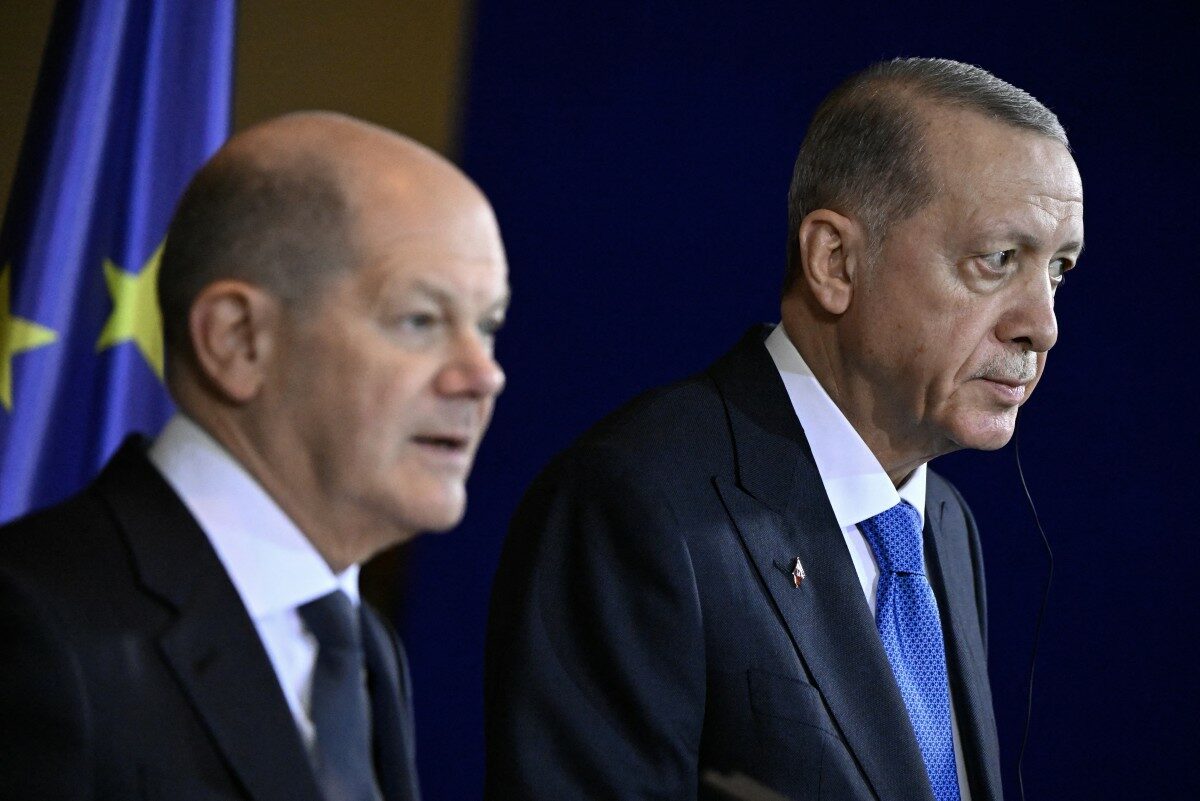Berlin, Germany – The conflict between Israel and Palestine has confirmed the inevitability of the two-state solution to the Palestinian issue, Turkish President Tayyip Erdogan said.
“The military confrontation between Israel and Palestine has confirmed that the Palestinian conflict should inevitability be resolved based on the two-state principle within the 1967 borders,” the Turkish president said at a press conference with German Chancellor Olaf Scholz in Berlin, which was broadcast by the Turkish television channel TRT Haber.
Erdogan was speaking about the recognition of the sovereignty of the states of Israel and Palestine, with the latter having East Jerusalem as its capital.
Germany and Turkey’s leaders traded barbs Friday over Israel’s war on Hamas, with Chancellor Olaf Scholz stressing the country’s right to self-defence while Recep Tayyip Erdogan demanded an end to Israel’s military operation.
Erdogan is on a highly controversial visit to staunch Israel defender Germany, made more tricky by his recent accusations directed at Israel.
The Turkish leader has branded Israel a “terror state” and repeatedly defended the Hamas who rule Gaza as “liberators” fighting for their land.
Erdogan did not repeat such statements in Berlin but nevertheless lashed out at Israel over its air and ground campaign in Gaza, triggered by the deadly October 7 attack by Hamas in Israel.
“Shooting hospitals or killing children does not exist in the Torah, you can’t do it,” he said at a joint press conference ahead of dinner with Scholz.
In talks with German President Frank-Walter Steinmeier earlier Friday, Erdogan had said that “Israel’s attacks on Palestinian lands must end and that the reaction from the whole world against human rights violations is important”, the Turkish presidency said in a statement.
But Scholz voiced backing for Israel’s war on Hamas, saying that long-term peace could not be forged in the region unless Hamas lost its ability to launch attacks.
“There is a need to make Israel’s self-defence possible and not to call it into question,” he said.
‘Difficult moments’
Erdogan has been increasingly critical of Israel’s war against Hamas, triggered after the Islamist group’s attack that Israel said killed around 1,200 people, mostly civilians, with around 240 hostages taken.
While Scholz travelled to Israel to offer Germany’s unconditional support, the Turkish leader has accused Israel of committing war crimes with its bombardment and ground incursion in Gaza.
The death toll there has hit 12,000, mostly civilians and including thousands of children, according to Gaza’s Hamas-run health ministry.
Ahead of his trip to Germany, Erdogan ramped up his verbal attacks against Israel, calling it a “terror state” and alleging the West was “trying to exonerate the murderers”.
In Berlin, Erdogan denied that his attacks against Israel were anti-Semitic, saying that he had “fought against anti-Semitism”.
Instead, he suggested that Germany, where anti-Semitism is illegal because of Berlin’s historic responsibilities over the Holocaust, was limited in its ability to speak freely about the Israel-Hamas war.
“I speak freely because we do not owe Israel anything. We did not go through the Holocaust,” Erdogan said, suggesting that Germany carried a “psychological debt”.
“If we were in debt, we could not talk so freely. But those who are in debt cannot talk freely,” he said.
Erdogan’s stance had sparked questions over the decision to host him at this time, with the opposition conservatives and even the liberal FDP, a member of Scholz’s coalition, urging the chancellor to scrap the invitation.
The Frankfurter Allgemeine Zeitung daily said Germany offered the “ideal stage” for Erdogan to position himself as a voice for the “global south”.
“As the loudest critic of Israel, he is underlining his demand for leadership of the Islamic world,” it wrote.
Standing next to Erdogan, Scholz acknowledged “it is no secret” that both sides viewed the conflict differently.
“That’s why in these difficult moments, we need direct talks with each other,” he said.
‘Uncomfortable partner’
Described as an “uncomfortable partner” by Scholz’s spokesman, Erdogan was on his first visit to Germany since 2020.
While ties between the two countries have always been uneasy, Berlin recognises that getting regional power Turkey onside was necessary to tackle thorny issues.
From mediating to get grain shipments out of Ukraine amid Russia’s war to negotiating a key deal on alleviating the 2015-2016 migrant influx into Europe, NATO member Turkey remains a crucial player.
Germany is also home to the biggest Turkish diaspora, and a majority of Turks in the country are supporters of Erdogan, including former German international footballer Mesut Ozil.

